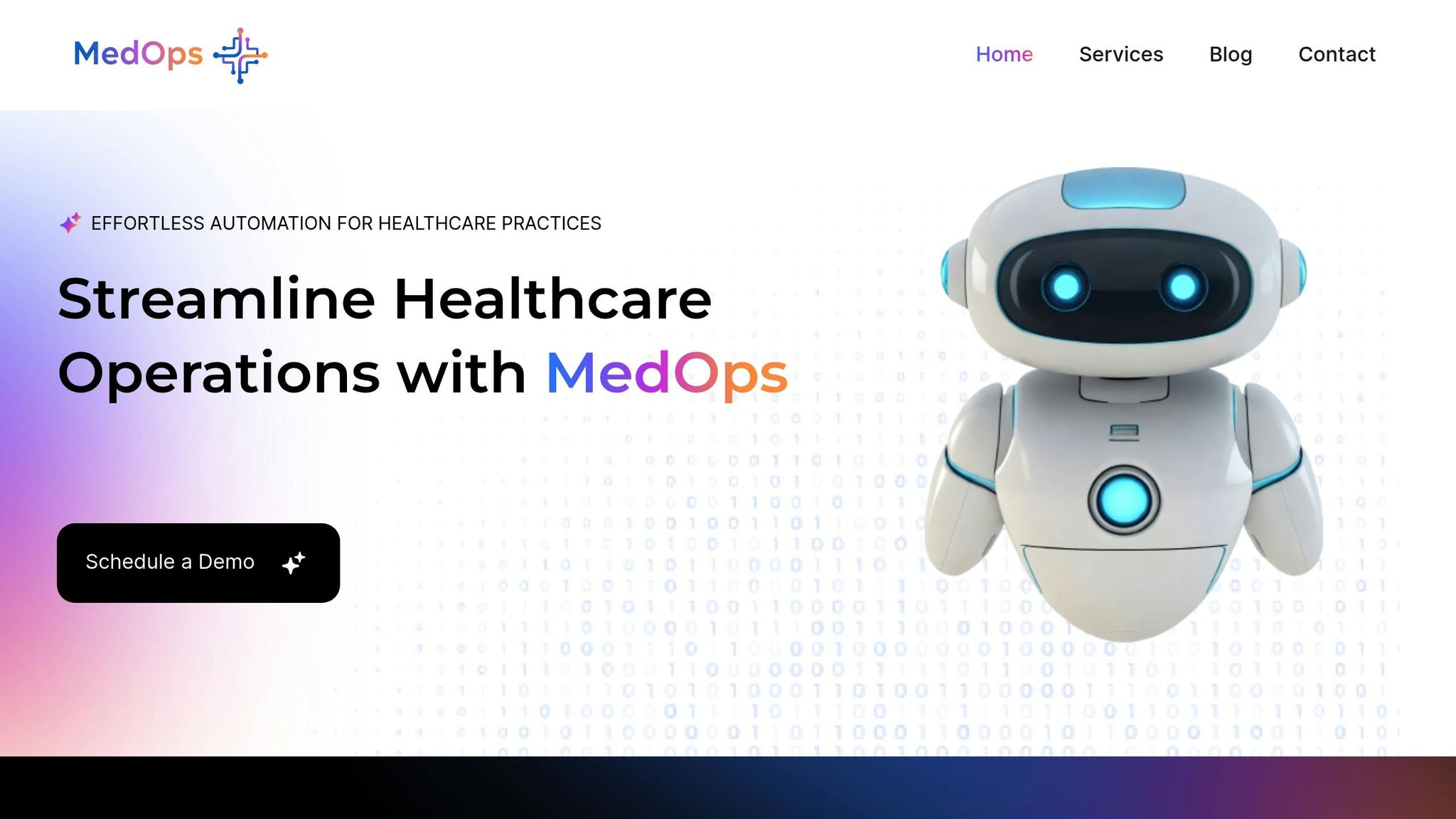Explore how AI addresses integration challenges in healthcare, enhancing data standardization, security, and workflow efficiency for better patient care.
Healthcare systems often face challenges like mismatched data formats, outdated technologies, and security risks during integration. These issues slow down workflows and disrupt patient care. AI tools are stepping in to solve these problems by:
Quick Summary of AI Benefits:
AI-powered solutions like MedOps are transforming healthcare operations, making integration smoother and more efficient. Want to know how? Let’s dive in.
Bringing together different systems in healthcare often leads to challenges that slow down processes and affect patient care.
Differences in data formats can make systems incompatible. Something as simple as how patient names are recorded can cause mismatches.
Here are some common format issues:
These inconsistencies make it harder to share and use data effectively.
Combining healthcare systems introduces serious security challenges that must be addressed.
Some major concerns include:
These risks highlight the importance of robust security measures during integration.
Older systems often lack the flexibility needed for seamless integration, making the process even more difficult.
Common issues with legacy systems include:
These limitations can hinder progress and require creative solutions.
Integrating systems can disrupt everyday operations, creating challenges for staff and patients alike.
Some key areas affected include:
Careful planning and gradual implementation, supported by focused training, can help ease these challenges and ensure patient care remains a priority.
AI offers practical solutions to tackle integration challenges in healthcare. These methods directly address the issues mentioned earlier, making processes smoother and more efficient.
MedOps uses AI to standardize inconsistent data formats. By applying machine learning, it aligns patient IDs, medical codes, date formats, lab units, and clinical documentation into a single, cohesive structure. This ensures systems communicate effectively while adhering to healthcare data standards.
For security concerns, advanced AI tools keep sensitive data safe during integration. Key features include:
MedOps' AI helps connect outdated systems with newer platforms. Its adapters translate legacy data formats into modern standards, allowing providers to keep using older systems while accessing updated functionality.
To avoid disruptions during implementation, MedOps uses AI to automate tasks like routing, insurance verification, scheduling, and resource allocation. This reduces manual work and ensures patient care continues smoothly.
Here’s a summary of how MedOps AI addresses these challenges:
| Integration Challenge | AI Solution | Key Benefit |
|---|---|---|
| Data Format Inconsistencies | Automated standardization | Fewer data entry errors |
| Security Risks | Real-time monitoring | Proactive threat prevention |
| Legacy System Limitations | Intelligent adapters | Easy integration of old and new systems |
| Workflow Disruption | Smart automation | Faster processing and uninterrupted workflows |

MedOps leverages AI to simplify healthcare integration, combining automation with workflow improvements to reshape how healthcare operations function.

MedOps focuses on improving essential healthcare processes through its core features:
| Function | Description | Key Impact |
|---|---|---|
| Insurance Verification AI | Validates insurance in real time, removing the need for manual checks | Speeds up verification |
| Custom Workflow Automation | Streamlines tasks and connects systems without sacrificing care quality | Boosts staff efficiency |
| Data Standardization | Aligns data formats across different systems | Maintains consistent data flow |
| Security Management | Automates compliance checks and strengthens data protection | Aids HIPAA compliance |
These tools work together to optimize operations, ensuring smooth daily workflows while driving improvements.
MedOps tackles common integration hurdles and provides clear advantages for healthcare providers:
"At MedOps, we use AI to optimize healthcare operations and improve patient care." - MedOps
With features like real-time processing, seamless integrations, and customizable workflows, MedOps increases efficiency and supports providers looking to modernize their systems. Its consistent performance across various healthcare setups makes it a reliable choice for integration upgrades.
AI is reshaping how healthcare systems operate. It tackles integration challenges by:
These advancements lay the groundwork for even more progress.
Looking ahead, healthcare integration will focus on better interoperability. Providers using MedOps stand to benefit from ongoing improvements, especially in real-time data validation and tailored workflow automation. MedOps' AI tools are at the forefront, driving these changes and helping streamline healthcare processes.
"MedOps is transforming healthcare operations with advanced AI automation. By simplifying workflows, reducing errors, and improving efficiency, we empower healthcare providers to focus on what matters most: delivering exceptional patient care." - MedOps
As AI continues to evolve, healthcare integration is set to become even more efficient and centered around patient needs.